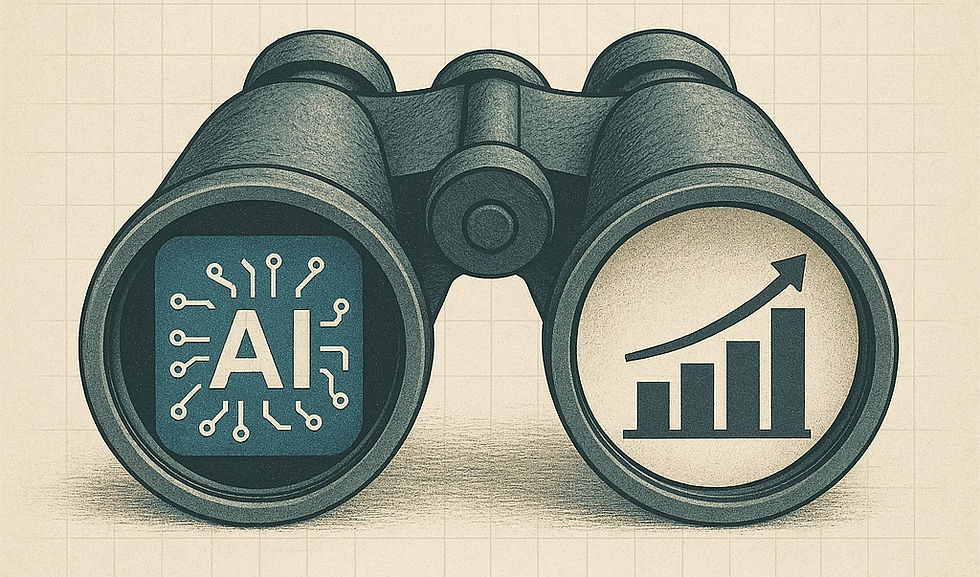Unlocking the Potential: AI's Impact on Future Business Operations
- Catherine Louropoulou
- Jul 15, 2025
- 3 min read
Updated: Sep 16, 2025
In today's fast-paced business environment, artificial intelligence (AI) stands out as a game-changer. As companies strive to operate more efficiently and innovate, AI technologies offer tools and strategies that can reshape how they do business. From improving customer service to optimizing supply chains, the applications are extensive and impactful.

And as companies navigate this evolving landscape, understanding AI's applications, advantages, and potential obstacles is crucial for success. With the right investment and strategies, businesses can harness AI's capabilities to improve efficiency, enhance decision-making, and maintain a competitive edge.
AI is making significant strides across diverse industries.
Healthcare : AI is fundamentally changing patient care in healthcare. For instance, AI algorithms are now capable of analyzing vast datasets from medical records to enhance diagnostic accuracy. This capability not only improves patient outcomes but also cuts costs related to diagnostic errors.
Finance : The finance industry benefits from AI in various ways, like detecting fraud and improving risk assessment. According to a report by McKinsey, AI can reduce the costs associated with fraud by up to 30% through real-time transaction monitoring. Additionally, AI systems can assess credit risk by analyzing a broader range of variables, ensuring more informed lending decisions.
Retail : Retailers utilize AI to enhance customer experiences through personalized recommendations. Furthermore, AI aids in supply chain management by forecasting demand trends, which can reduce inventory costs by as much as 20%.
Manufacturing : In manufacturing, AI-powered automation has dramatically improved operational efficiency. Predictive maintenance technology, which forecasts machinery malfunctions, allows companies to minimize unplanned downtime, potentially increasing productivity by up to 25%.
Integrating AI into business operations provides several notable advantages that contribute to enhancing overall performance.
AI can process vast amounts of data much faster than humans leading to improved efficiency. For example, AI tools can analyze thousands of customer feedback forms in minutes, enabling companies to respond quickly to consumer concerns. This efficiency not only accelerates workflows but also frees employees to focus on strategic initiatives, boosting productivity by an estimated 16%.
AI equips decision-makers with actionable insights from data analysis and enables enhanced decision - making. For instance, AI analytics platforms can forecast market trends and customer behavior with over 90% accuracy. Access to this real-time data allows businesses to adapt promptly to changes, improving their competitive response.
With automation of routine tasks, AI significantly reduces operational costs. A study by Deloitte found that organizations implementing AI-driven automation saw operational cost savings between 20% to 30%. These savings stem from reduced labor costs and minimized errors, which can enhance an organization’s financial health.
Companies adept at using AI can foster innovation, enhance customer experiences, and improve operational processes. A recent survey highlighted that businesses leveraging AI effectively enjoy a significant competitive advantage. About 61% of executives believe that AI helps them outperform their peers in terms of customer satisfaction and market share.
Despite its potential to transform business operations dramatically, offering numerous benefits, integrating AI into business practices can be challenging.
Integrating AI into business practices could incur high implementation costs. Especially for smaller companies these costs may prove extremely difficult to manage effectively.
Also handling large volumes of personal data could raise serious privacy issues. Companies must comply with strict regulations like GDPR, and any mishandling can lead to severe penalties. A survey showed that 70% of consumers are concerned about data privacy, which could impact their trust in companies utilizing AI.
The lack of skilled professionals poses another challenge. Many organizations struggle to find individuals with the expertise needed for AI development and management. Also employees may perceive AI with skepticism, fearing job loss. It is essential for leaders to manage this anxiety, providing training programs and clear communication regarding how AI will complement rather than replace human roles.
Looking ahead, several trends are expected to shape AI's role in business operations.
The evolution of AI technologies will increasingly enhance data integration and analysis, leading organizations to rely on AI-driven insights for strategic decisions. In the future, AI systems will be capable of processing even more diverse data sources, resulting in richer and more comprehensive insights.
Also as customer expectations evolve, the demand for personalized experiences will catalyze advancements in AI. Businesses will invest in more sophisticated analytics to tailor product recommendations, increasing customer engagement and loyalty. But with growing awareness of AI's societal impact, companies will focus on developing ethical AI systems. This includes ensuring transparency in AI applications and maintaining fairness in decision-making processes to protect consumer trust.
Finally, AI is poised to complement human skills rather than replace them. Future AI systems will support workers in various tasks, allowing them to focus on critical issues that require creativity and problem-solving. This collaboration can enhance productivity, driving business growth.
As we progress, the synergy between human talent and AI innovations will undoubtedly shape the future of business operations for years to come.




Comments